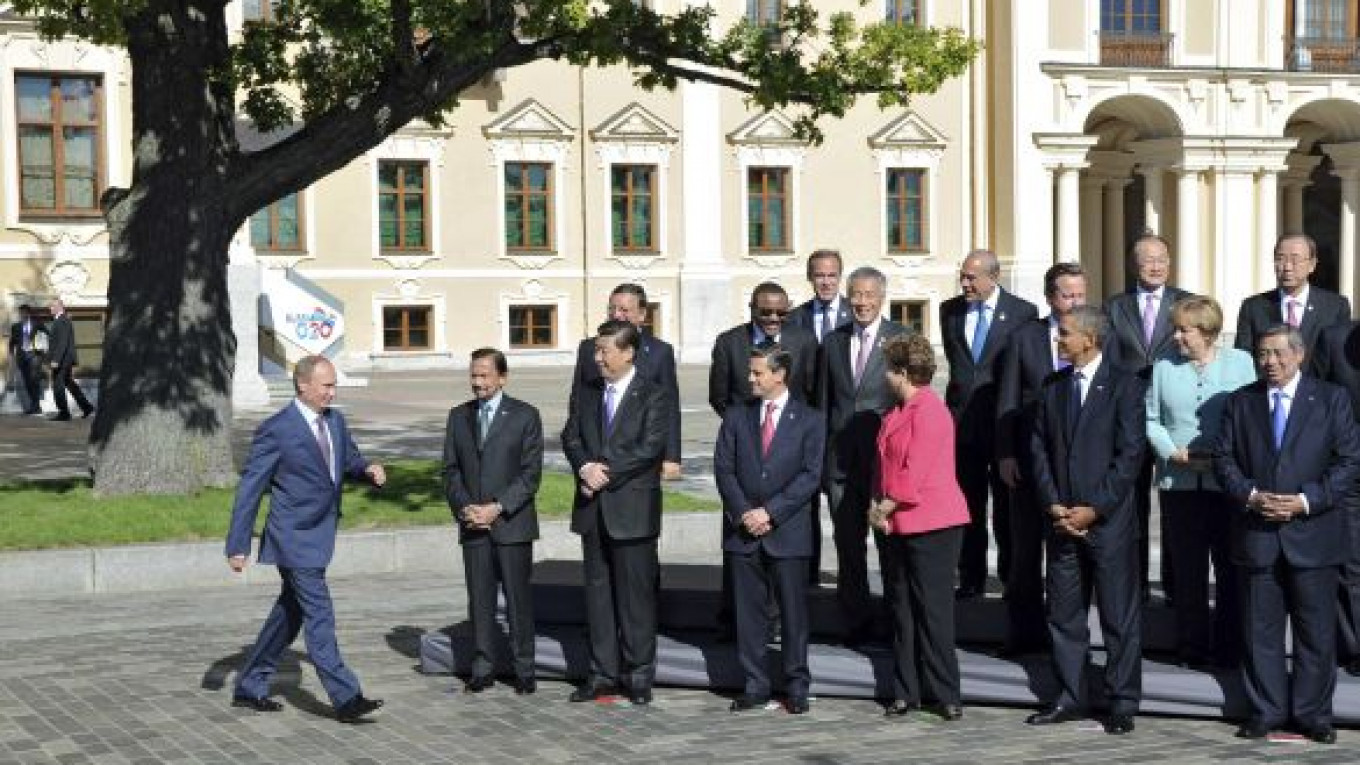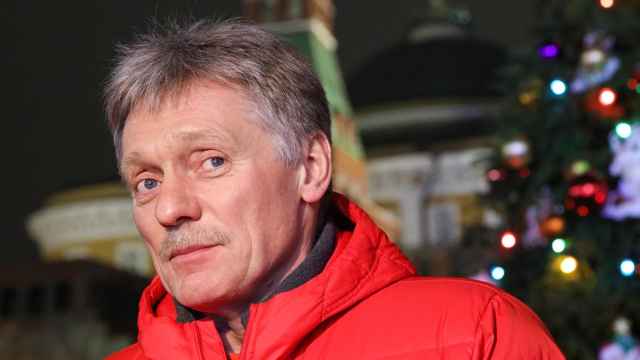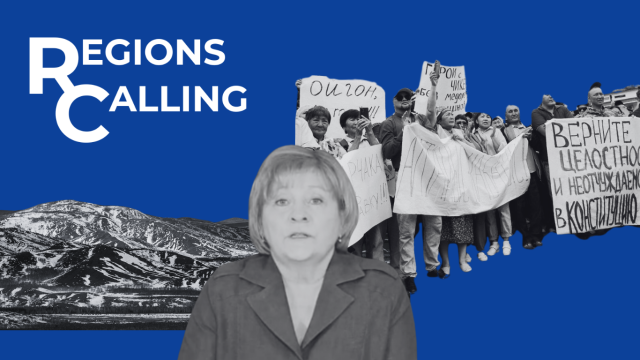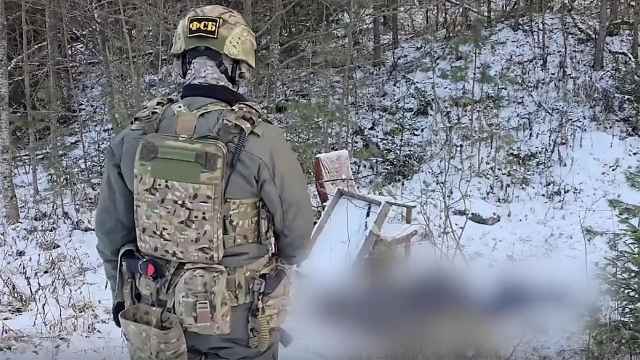ST. PETERSBURG — U.S. President Barack Obama urged Americans on Saturday to back him in launching an attack on Syria, as diplomatic pressure grew on the U.S. to wait for a UN report expected in a week's time before beginning military action.
Fresh from a European trip in which he failed to forge a consensus among global leaders, Obama plunged into a campaign on radio and television to try to convince a skeptical U.S. public and Congress of the need for a military strike on Syria.
In Europe, pressure increased for delay. European Union foreign ministers meeting in Lithuania on Saturday blamed the Aug. 21 chemical weapons attack in Syria on President Bashar Assad's government. But they did not endorse military action and made clear that the bloc wanted the United Nations to have a role in agreeing on an international response.
At the Group of 20 summit in St. Petersburg on Friday, the world's leading powers made little progress toward a unified position on addressing the Syrian civil war. Obama met fervent resistance to a military strike from President Vladimir Putin, who said the U.S. would be acting "outside the law" if it were to order action against Assad's forces.
"I remind you that the use of force by a sovereign government is possible only when it is in the form of self-defense — and the United States, as is known, is not being attacked by Syria — and, secondly, by a resolution of the UN Security Council," Putin said, speaking emphatically, at a news conference at the summit's close.
"As one of the participants of our discussion yesterday put it, those who act otherwise are putting themselves outside the law."
Obama, clearly still the reluctant warrior who rose to political prominence on his opposition to the Iraq war, emphasized he favored limited strikes on Syria to deter future chemical weapons attacks — not another costly and protracted conflict.
"This would not be another Iraq or Afghanistan," Obama declared in his weekly radio address, previewing arguments he will make in a nationally televised address Tuesday.
Lawmakers returning to Washington after a summer break say many of their constituents have told them they do not think the U.S. should respond militarily to the August chemical weapons attack that Washington blames on Assad's government.
Many EU governments have expressed reservations about using military force to punish Assad, now fighting a 2 1/2-year battle against rebels in which more than 100,000 people have died.
In a carefully worded message, the foreign ministers of 28 EU governments stopped short of endorsing possible U.S. and French military action against Syria ahead of the UN report.
French President Francois Hollande said the report could be made public at the end of next week and he suggested that France might then wish to take the matter to the UN Security Council, a step that could further delay any action.
U.S. Secretary of State John Kerry, who was also in Lithuania, said later that Obama had made no decisions about waiting for the UN inspectors and was keeping options open.
At the G20, Hollande voiced strong support for a strike, arguing that it could help turn the tide of the conflict.
"There is no military solution for the Syria crisis, but a short military action can [speed up] the political solution," Hollande said at a news conference.
Hollande also said every country at the summit acknowledged that chemical weapons were used in the Aug. 21 attack in a Damascus suburb.
Obama may have been at a disadvantage trying to convince world leaders to oppose Putin's position while on Russian soil. Looking worn out at his press conference after days of travel and tough negotiations, the U.S. leader acknowledged that Russia was not likely to come around to his position.
Obama also said Russia and other nations would eventually have to put aside their differences and work to find a political solution to the Syria conflict.
Chinese President Xi Jinping, who has been a less visible opponent of military action in Syria than Putin, also met with Obama and reiterated China's position.
"A political solution is the only right way out for the Syria crisis, and a military strike cannot solve the problem from the root," Xi told Obama, according to Chinese state news agency Xinhua.
The Chinese leader also said all countries should abide by international law and reject the use of chemical weapons, and he renewed calls for a peace conference between the Assad regime and Syrian rebels that the U.S. and Russia, together with the UN, had been trying to arrange in Geneva.
Lavrov said a military strike that was not approved by the UN Security Council would foil those efforts.
"Many responsible governments are gaining a very clear understanding that the use of force in contravention of the UN Security Council would, in essence, put an end to efforts to achieve a political solution, to convene the Geneva-2 peace conference that [UN Special Envoy] Lakhdar Brahimi is directly working on," Lavrov told journalists after a working breakfast at the summit, Interfax reported.
Leaders also remained split over who was to blame for the alleged chemical weapons attack last month that killed hundreds of Syrians.
A group of 11 nations including the U.S., Britain, Italy and Japan issued a statement saying that they believed Assad was behind the attack, while Putin repeated the Russian view that it was a "provocation" by a militant group seeking assistance from the West.
While political talks occupied world leaders at the G20, military posturing continued in the Mediterranean Sea, where U.S. and Russian ships have been stationed. On Friday, a Russian Navy representative told Interfax that four ships had traveled through the Dardanelles in Turkey heading for the eastern Mediterranean.
The ships included landing vessels Novocherkassk and Minsk, and a reconnaissance vessel, the Priazovye.
Putin said during his press conference that Russia would assist Syria if military action was taken against Assad's forces, noting that Russia already delivered arms and economic aid. He said he hoped to provide more humanitarian assistance to civilians, "who have ended up in a very difficult situation in that country."
Material from Reuters is included in this report.
Contact the authors at [email protected], [email protected] and [email protected]
A Message from The Moscow Times:
Dear readers,
We are facing unprecedented challenges. Russia's Prosecutor General's Office has designated The Moscow Times as an "undesirable" organization, criminalizing our work and putting our staff at risk of prosecution. This follows our earlier unjust labeling as a "foreign agent."
These actions are direct attempts to silence independent journalism in Russia. The authorities claim our work "discredits the decisions of the Russian leadership." We see things differently: we strive to provide accurate, unbiased reporting on Russia.
We, the journalists of The Moscow Times, refuse to be silenced. But to continue our work, we need your help.
Your support, no matter how small, makes a world of difference. If you can, please support us monthly starting from just $2. It's quick to set up, and every contribution makes a significant impact.
By supporting The Moscow Times, you're defending open, independent journalism in the face of repression. Thank you for standing with us.
Remind me later.






